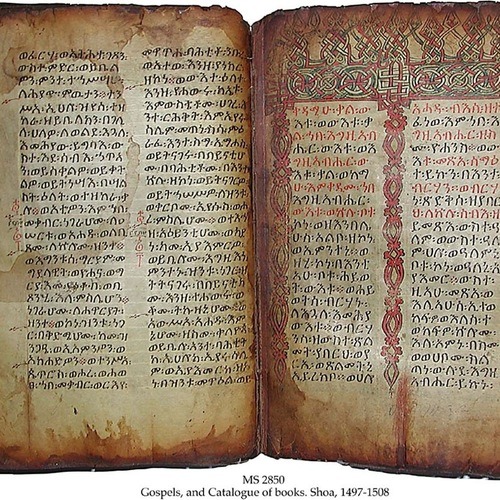- Ethiopian Apocrypha Iiirejected Scriptures John Hagee
- Ethiopian Apocrypha Iiirejected Scriptures Study
- Apocrypha Books Of Bible
- Ethiopian Apocrypha Iiirejected Scriptures Fulfilled
- Kjv Bible With Apocrypha Free
Also, I accept the Ethiopian and Syriac books even more than I do the apostolic fathers. 1 Enoch is divinely-inspired Holy Scripture in my eyes. So are the Syriac Scriptures that have come down to us in the name of Baruch and others. I really feel like you just want to argue. You need to examine yourself. Paul says avoid people who cause divisions. Apocrypha is a plural word (singular: apocryphon) that originally denoted hidden or secret writings, to be read only by initiates into a given Christian group. It comes from Greek and is formed from the combination of apo (away) and kryptein (hide or conceal). The word apocrypha, like many other words, has undergone a major change in meaning throughout the centuries. The first historical reference to an Ethiopian in the Bible is the incident of the Cushite (i.e. Ethiopian) slave who carried to David the news of Absalom’s death (2 Sam 18:21-23, 31, 32). There were Ethiopian mercenaries in the army of Shishak, a Libyan king of Egypt, when he invaded Pal. ( 2 Chron 12:3 ).
Dangerously Corrupt:Ethiopian Apocrypha Iiirejected Scriptures John Hagee
Testaments of the Twelve Patriarchs
Book of Deuteronomy
Letters of Ignatius
Book of Proverbs
2 Esdras
Gospel of Matthew
1-3 Meqabyan
Book of Tobit
2 Peter
Jude
3 John
2 John
Barnabas
Hebrews
2 Clement
1 Clement
1 John
1 Peter
3 Maccabees
Some Bibles not only have the Old and New Testaments but also include another collection of books called the Apocrypha. The Apocrypha (Greek apokrupha, “things hidden away”) is a collection of books and parts of books found in the Septuagint (the Greek translation of the Old Testament) which were not maintained as part of the Hebrew Bible, what we understand today as the Old Testament. These additional materials were written between the time of Malachi and John the Baptist, ca. 400-1 BCE.
The Apocrypha is made up of a variety of types of books. It features some “historical” novels (Tobit, Judith, additions to Esther, Susanna, Bel and the Dragon [the latter two are parts of the additions to Daniel]), wisdom literature (Wisdom of Solomon, Sirach [or Ecclesiasticus]), psalms/prayers (Psalm 151, Psalms of Solomon, Prayer of Azariah and the Song of the Three Holy Children [part of the additions to Daniel], Prayer of Manasseh), prophetic material (Baruch, Letter of Jeremiah), historical accounts (1 [or 3] Esdras, 1, 2, 3, and 4 Maccabees), and apocalyptic (2 [or 4] Esdras). Some used to say that they were all written in Greek; copies of Sirach and Tobit were found in Hebrew among the Dead Sea Scrolls, and the best evidence suggests that most of the books of the Apocrypha are translations of Hebrew originals except the additions to Esther, Wisdom of Solomon, and 2-4 Maccabees.

Ethiopian Apocrypha Iiirejected Scriptures Study
The Apocrypha reflects the faith and lives of Jewish believers striving to hold firm to their belief in God in the face of foreign domination and oppression. They tell stories, real and imagined, of God’s people holding firm to their faith while defeating pagan overlords. They express their petitions and praise to God; they perpetuate the traditions of wisdom literature. They look forward to the day when the Messiah would come and their pagan enemies would be decisively and finally overcome.

Apocrypha Books Of Bible
The relationship between the Apocrypha and the rest of the Bible has been a point of contention for millennia. The apocryphal books were not considered inspired by the Jews and thus left out of the Hebrew Bible. There are perhaps a few vague references to material in the Apocrypha in the New Testament, but neither Jesus nor the Apostles ever fully affirm the Apocrypha as part of Scripture. The Apocrypha was considered “deuterocanonical” by many afterward: profitable for reading, but not truly inspired Scripture.
Ethiopian Apocrypha Iiirejected Scriptures Fulfilled
The Apocrypha obtained the status of fully inspired Scripture only within Roman Catholicism and among the Ethiopian Orthodox; the Eastern Orthodox and the Anglicans continue to consider them to be secondary and not fully inspired.
Even the content of the Apocrypha is disputed. Roman Catholicism accepts only Tobit, Judith, Wisdom of Solomon, Sirach, Baruch, Letter of Jeremiah, 1 and 2 Maccabees, and the additions to Daniel and Esther as representing the Apocrypha. The Eastern Orthodox accept all of these along with Psalm 151, the Prayer of Manasseh, 1 [3] and 2 [4] Esdras, and 3 and 4 Maccabees. The Ethiopian Orthodox accept these as well as other books normally associated with the Pseudepigrapha (another collection of Jewish literature).
Kjv Bible With Apocrypha Free
God is a God of peace and not confusion (1 Corinthians 14: 33); what is and what is not Scripture should be clear (2 Timothy 3:16-17). Some apocryphal materials are clearly fictitious stories (Tobit, Judith); the author of 1 Maccabees confesses that there is no prophet alive and active during the events described (1 Maccabees 4:36, 9:27, 14:41). The Apocrypha is not inspired Scripture like the Old and New Testaments and should never have been accorded such status.
Yet there is value in the Apocrypha: some of its material describes the fulfillment of the events prophesied by Daniel, and by getting a glimpse into Jewish life in the period between Malachi and John the Baptist, we can better understand the life and times of Jesus and the Apostles, and thus why the Jews believed and acted the way that they did so long ago.
ELDV




